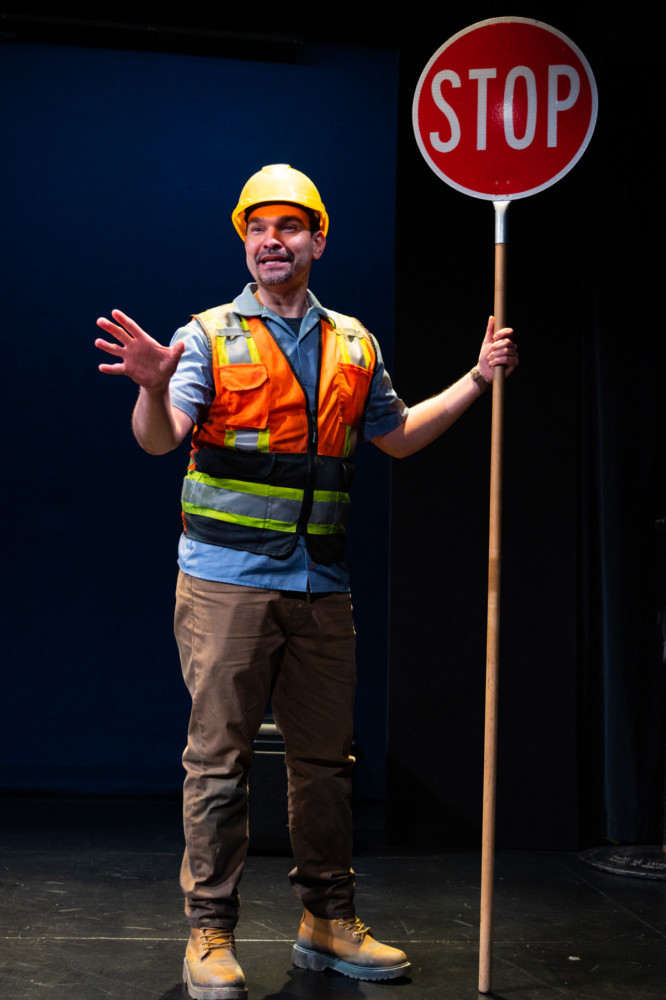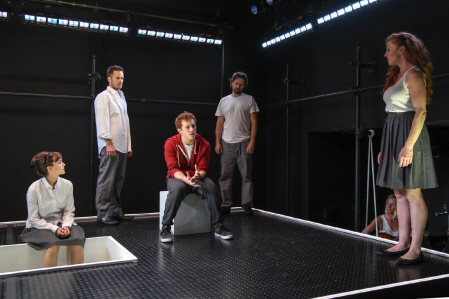
Javier Muñoz
By Ron Fassler
One-person plays are a tough, yet ubiquitous, breed. Ideal for a smaller budget, the temptation to produce them is clear, though they are no easier to write than a play that allows for conversation between two or more people. In fact, they are harder. If someone is portraying one person for an entire show, then whenever they ask a question, it means there is no one on the other end to debate them. This can lead to a certain flatness in performance, as well as for a one-sided argument. What you have then is something of a TED Talk; or worse, pontification.
Stephen Lloyd Helper’s new play A Sign of the Times— which has just opened at Theater 511 (one of two rental spaces at Ars Nova)— is well-intentioned, though it fails somewhat as a drama. That Helper chose to direct the production might play into that a bit, as another set of eyes and ears could have guided him to avoid a few pitfalls. It’s a similar issue to one that puts a one-person play up against one that isn’t: When it’s over, the different points of view expressed and dissected are better to mull over with another person, rather than decipher alone. That the subject matter encompasses the sprawling topic of the meaning of life and death doesn’t help the cause either. Spoiler Alert: the play’s sole character dies two-thirds of the way into the play, leaving the last 30 minutes to take place in the great beyond. There’s nothing wrong with that, except that in this case the weight of it all is too much for this rather thin piece to bear.
It’s no fault of Javier Muñoz, the actor charged with playing the leading character— who is identified in the program as “Man.” Again, I’m sure this is to depict him as “every man,” but that’s a false lead. He isn’t “every man” since he is one of those rare, unfortunate souls who has had to survive the tragic death of a young child— a son— as well as the subsequent loss from the abandonment of his wife, who took off with their baby daughter when he ceased to function at his former best. Grieving, the Man even finds himself falling into a sexual encounter with his best male friend, which only adds a confusing sidebar to the story.

Javier Muñoz
Dressed in a worker’s fluorescent vest and a hard hat on an empty stage, the Man is first seen as the lights come up holding onto a reversible STOP/SLOW traffic sign on a long pole. He calls it “Fred,” and it’s his friend. He literally has taken its warning of “Stop” and “Slow” as a means to help him on his recent and difficult journey. As he explains, after the death of his son, he could no longer relate to teaching or to his students and took a job on a highway as a traffic coordinator, as its mindlessness offers him a chance to be freed from tougher responsibilities. This allows for meditations on the act of slowing down, speeding up, and pacing one’s self for life’s arbitrary disasters. How things in the abstract become real and how the Man deals (or avoids dealing) with them are at the crux of his story— and it is only his story to tell). Unfortunately, the revelations revealed are often too on the nose— with metaphors of time, lightness and darkness, and life and death— to allow for deeper interpretation.
Muñoz, who I was fortunate to see play the title role in Hamilton when he succeeded Lin-Manuel Miranda, is a wonderful actor. He brings intelligence and warmth to the proceedings and I believed him as this well-intentioned, though decidedly tortured soul. But he performs in a vacuum. I would have liked to have been more challenged by this piece, which attempts to take its audience on a journey into questions of genuine importance, but ultimately can’t live up to its promise, providing bromides and platitudes in place of a story with greater conflict and depth.
Photos: Russ Rowland
A Sign of the Times
Theater 511 at Ars Nova – 511 West 54th Street, NYC
Now through April 4
Tickets: https://www.theatermania.com/venues/new-york-city-theater/theater-511_12805


















